In a policy document, the country’s trade ministry has recommended limiting the public use of foreign words, including abbreviations, Euroradio reported.
In practice, it means replacing English with Russian, according to the Poland-based Belarusian news service, Belsat.
JOIN US ON TELEGRAM
Follow our coverage of the war on the @Kyivpost_official.
For the past 30 years, Belarus has had two official languages, Belarusian and Russian.
But with the country’s Russification, the latter has become increasingly dominant.
Advertising restrictions
The recommendation to ban words and terms from non-official languages in the public realm comes from a strategy setting out Belarus’ cultural development between 2024 and 2026.
Language restrictions should be slapped on “the names of commercial and service establishments and advertising, including ads intended for placement on signs and vehicles of public transportation,” the strategy stated.
This measure, among others, is aimed at “ensuring cultural security of the Republic of Belarus, protecting the national cultural space, preserving and strengthening the traditional values of the Belarusian people” as well as “countering threats to national security.”
Belarusian in decline
Russian is the language set to gain from this policy change, reports say.
For a brief period of post-independence in the early 1990s, Belarusian was the country’s only official tongue – but upon taking power in 1994, President Aleksander Lukashenko made Russian co-official.

Elon Musk Backs Down from X Fight After Belittling Polish Foreign Minister
Over his three-decade-long rule, Belarusian has increasingly been sidelined, with the longtime ruler dismissing it as “a poor language” in which “nothing significant can be effectively expressed.”
In 1999, nearly 86% of the population said Belarusian was their native tongue, but that figure had fallen to 61% by 2019, Belsat reported. Less than a third of Belarusians use the language daily.
Reports suggest that the process of Russification has intensified recently. A report from the Euronews site last September said that fewer than one in ten schoolchildren in Belarus now receive their education in Belarusian.
“It is obvious that our children are being deliberately deprived of their native language, history, and Belarusian identity,” one parent told the website.
Russia has increased its influence over its western neighbor since mass anti-regime protests in Minsk and other cities in 2020, with one think tank branding it a “quiet conquest.”
You can also highlight the text and press Ctrl + Enter











